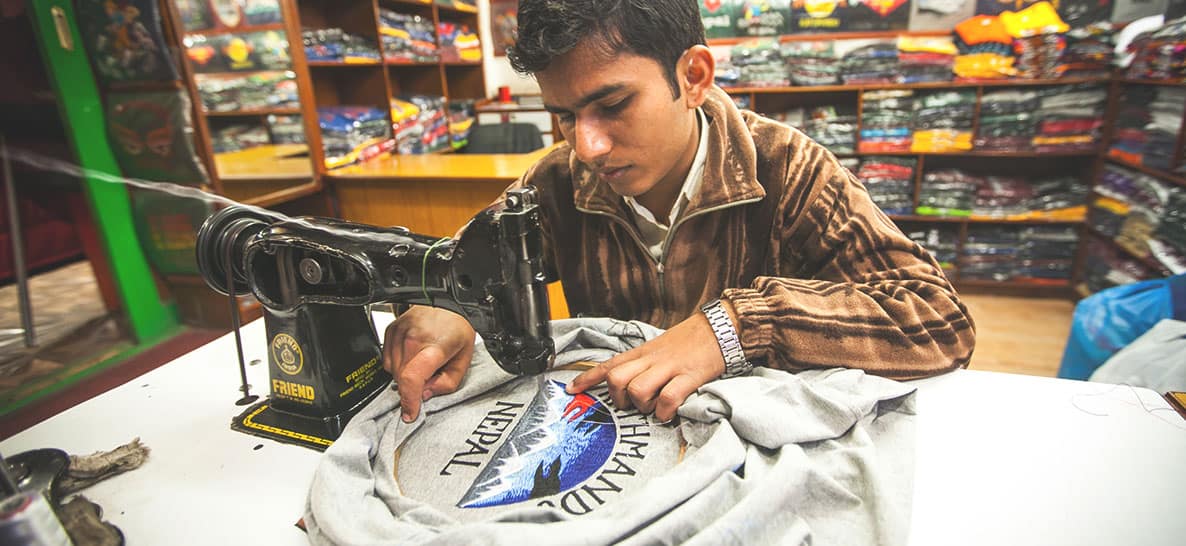
I have standards when it comes to where I work.
1) I have to have regular time off each week (it’s really for the sake of others).
2) Food is necessary. You don’t have to provide it, but I have to be able to have access to some (Hangry is a thing—and I get really hangry—just ask my family).
3) I will get paid a fair wage.
4) When I’m legitimately sick, I’m not coming to work (trust me, you don’t want me to).
5) I will not do anything illegal; no matter how much you pay me.
6) I want to feel safe.
7) I retain the right to leave my employment situation at any time.
Millions of people around the world don’t have a chance to make any sort of demands like any of these. Millions of people around the world work in sweatshops.
I’ve heard that word bandied about a lot since I was little. Sweatshop. I associate it with kids in a dark, sweaty room working their fingers bloody making soccer balls or T-shirts. While places like that may exist, most sweatshops probably look nothing like that.
A sweatshop is defined as a factory that violates two or more labor laws. This could be anything pertaining to child labor, wages and benefits and/or working hours. From the outside, it could look completely legitimate, and they often do. But if they require their employees to work 12-hour days, 7 days a week for meager pay that isn’t even enough to feed them, then it’s a sweatshop regardless of the actual working conditions.
We tell ourselves that it’s giving people jobs who otherwise wouldn’t have one. We tell ourselves that people are happy with what they have. We tell ourselves that the cost of living is so much less and that’s why they get paid next to nothing.
We tell ourselves that this is just the way the world works. This is how companies stay competitive in today’s market. During the Industrial Revolution, kids and people worked in these type of conditions and worse, so it’s just a natural part of a growing economy.
And I think it’s these lies we’re forcing ourselves to believe that make us feel better about what we’re supporting with our purchases. Sweatshops do not alleviate poverty when families can’t even afford to feed themselves, when approximately 246 million children between the ages of 5 and 14 are forced to work instead of attend school, and when men and women are forced to work in abusive situations they are unable to leave.
Instead, we should be ensuring that our money is invested in ethical companies that are paying a living wage and treating their employees fairly. Because the truth is, if your clothing doesn’t come at a financial cost, it comes at a human cost.
We see examples of that human cost all the time. A couple years ago, a factory building collapsed in Rana Plaza, Bangladesh killing more than 1,100 people. On Thursday, a fire in a footwear factory in the Philippines killed at least 72 factory workers. And there are plenty of examples of human cost we don’t see or hear about, like the rampant sexual abuse that occurs in garment factories or lack of education children are receiving because they’re working 12 hour days or the human trafficking that occurs in the garment industry.
We need to recognize the lies we are telling ourselves to make it OK for us to purchase clothing made in sweatshops, and we need to take a stand for ethical business practices, recognizing the safety and health of our brothers and sisters around the world. Isn’t it our moral obligation as Christians to do so? (Proverbs 31:8-9)
Here are some ways you can take a stand for employee rights:
Educate yourself on what sweatshops look like.
Education is an important step in achieving social and permanent change! Check out ethical companies or companies supporting local communities. When you think about how much money you spend on things each year, that translates into influence. Use that influence to support companies that are doing good and treating their employees fairly.
Ethically made clothing costs a bit more, yes, but that translates to improved conditions and a living wage for those making the items you’re buying.
Buy less!
You don’t need more stuff. Build yourself a capsule wardrobe from items you already have, don’t buy flimsy, trendy items that will fall apart in two weeks, invest in classic items that will last you a lifetime, and treat your property well so that it will last.
We want people to have a chance for employment, but we shouldn’t sacrifice the desire for people to be treated humanely just because we want to see them employed. We should fight for employment while also fighting for human rights. It’s not an “either-or” situation. It’s a moral imperative. It’s the Golden Rule: “Do unto others as you would have them do unto you” (Matthew 7:12).
If you want to work and be treated like a human being who has thoughts, feelings and desires, shouldn’t that be how you’re treating others? Even though you may not see the place a product is made, if you knowingly buy something from a sweatshop your purchase is directly saying you support the decision for people to work in sweatshops.
The Bible teaches us that every person is important. Every person is valuable. Live your life as if this is true. Say no to sweatshops.
Photo credit: De Visu / Shutterstock.com






















